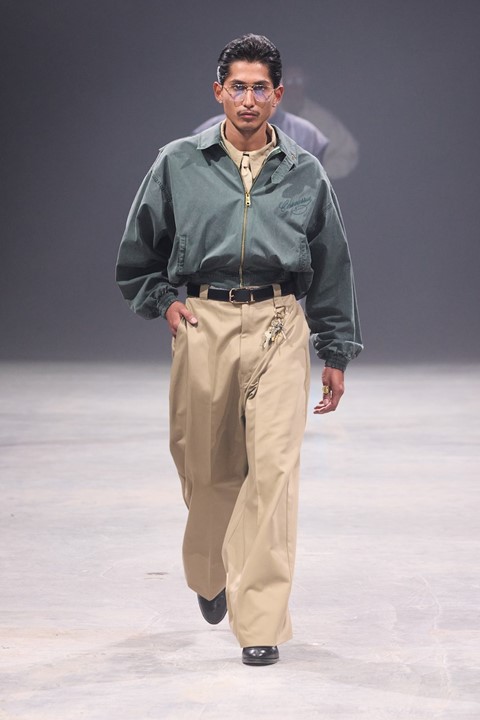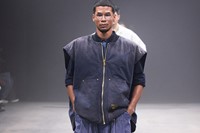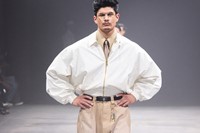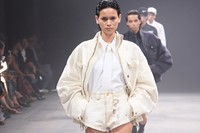Biz Sherbert reports on New York Fashion Week Spring/Summer 2025, taking a closer look at brands like Willy Chavarria, Ralph Lauren, Coach and Elena Velez
At New York Fashion Week, everyone wanted to figure out America. Pieter Mulier looked to Halston and Charles James at Alaïa, Tory Burch referenced American football and Ib Kamara brought Off-White’s presentation stateside for the first time.
Willy Chavarria said it with his chest, titling his Spring/Summer 2025 collection América and staging the show across from the building-sized American flag that wraps around the New York Stock Exchange. The Clermont Twins sat front row, as did the eminent fashion historian Valerie Steele, perhaps on the lookout for additions to the museum collection she oversees at the Fashion Institute of Technology. I watched the case for acquisition develop in real-time; Chavarria’s reimagined uniforms looked amazing and emphasised the cultural and economic history of immigrants in America. One set of looks referenced the workwear of farm labourers, with wide-brimmed straw hats and bandanas worn around the face. That’s the kind of thing that beckons to be preserved for posterity. And Chavarría said he wanted to make clothes that will sell – what’s more American than that?
Ralph Lauren doubled down by bringing guests, including first lady Dr Jill Biden, to the Hamptons to see this season’s stars and stripes. Lucky Blue Smith walked the runway for what felt like his first big show since he became a husband, and grew out the bleach job that made him famous. Both the Hamptons and Smith have received more attention than usual this year, more or less for the same reason – everyone online wants a taste of their America, where everything “looks expensive” and leisure is taken seriously. If Chavarría’s show was the American dream at work, Lucky Blue Smith in Ralph Lauren in the Hamptons was an almost hyperreal dream of America – like a TikTok filter that emulates the grain of the film in the Kennedys’ home movies.
At Coach, American classics were reinterpreted yet again. The model who opened the show wore a navy blazer and chinos, but her hair was short and pink and her ‘I Love NY’ T-shirt was covered in schoolyard graffiti (like almost everything else in the show). The collection was about being young and breaking rules – just not very serious ones. Ella Emhoff, who is in the running for first daughter of the United States, walked and the guest list included tanned TikTok stars who have yet to be editorialised. The clothes and bags made me excited for kids shopping at the mall right now, where Coach held court during its heyday in the 2000s and which has become a renewed site for discovery for the brand’s Gen Z target audience.
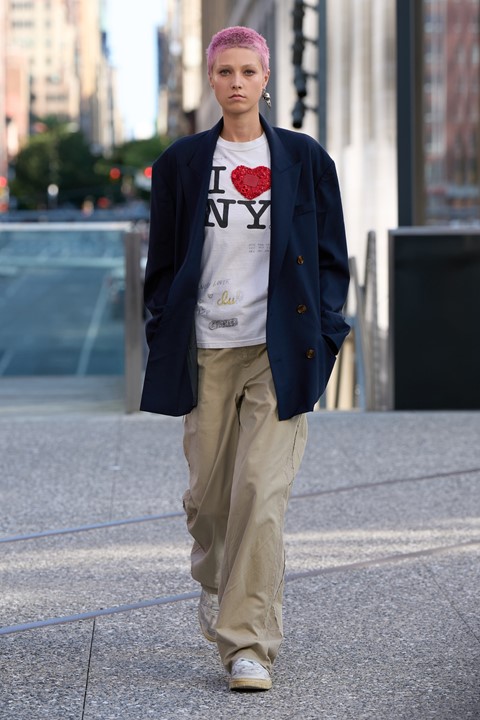
Buoyed by the youthful energy of the Coach show, I walked ten minutes from the show location to the Fashion Institute of Technology to speak with some young people. I heard that basics are big on campus this semester – everyone is wearing button-down shirts and bootcut jeans. It seemed America was in the air there, too. Madison, a student journalist wearing red tights, brought up the idea of democracy when I asked her thoughts on New York Fashion Week. It isn’t as exclusive as Milan or Paris fashion weeks and, she said, that makes it less and more exciting. Perhaps there are too many tanned TikTok stars in the front row, but points of entry are more accessible for those beyond the appointed few, and that’s something that still matters.
On the last day of fashion week, Elena Velez presented her collection La Pucelle, the title a disambiguation for the French national heroine Joan of Arc. Velez has always had something to say about America – her identity as a woman from the Midwest has been central to her work since her debut and her controversial show last season probed at the legacy of the Confederate South. This season she made muses of women canonised as symbols of freedom, the likes of Joan, Marianne and Lady Liberty herself, in an endeavour to reorient her reputation from provocateur, a label she resists, to punk. The clothes they inspired are her most commercial yet – Velez showed relaxed versions of her signature corsetry alongside a T-shirt with a corset printed on and lots of leather.
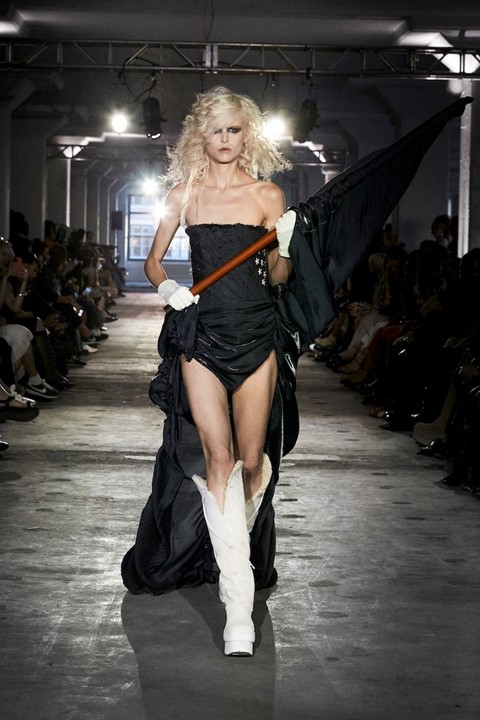
More dedications to freedom were found throughout the show. Like a scene from a Lana Del Rey music video, a biker gang made of veterans and former police and firemen stood outside the venue as guests entered. The front row featured guests whose work is often at the heart of the debate around free speech and free thought, and Velez even partnered with the Foundation for Individual Rights and Expression, an organisation dedicated to defending those principles.
Earlier in the week, when I spoke with Velez about her recent move from Brooklyn to the Hudson Valley, she described the personal significance of being able to own land in New York, especially with a husband who is freshly a US citizen. “I think the pull for us was really about having space to, you know, stick a flag in the ground and claim as ours.” The show closed with Velez’s take on Liberty leading the people, flag soldiered across the model’s shoulder.
